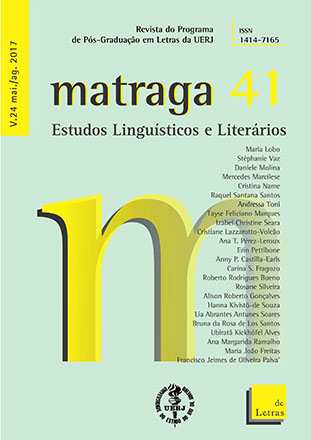Ora está, ora não está: <i>input</i> variável e aquisição da flexão verbal de 3ª pessoa do plural no PB
DOI:
https://doi.org/10.12957/matraga.2017.28498Palavras-chave:
aquisição verbal, variação linguística, flexão verbal variável, percepção, compreensão.Resumo
Este artigo investiga a percepção do morfema flexional de 3ª pessoa do plural em verbos e a compreensão da informação de pluralidade veiculada por tal morfema por crianças adquirindo o PB, tendo em vista que a realização da flexão de número mostra-se variável nessa língua, tanto no âmbito nominal quanto verbal. Estudos prévios em diferentes línguas sugerem que, embora essa flexão seja produzida por volta dos três anos de idade, até os seis anos, crianças apresentam dificuldades na sua interpretação em tarefas de compreensão (JOHNSON; DE VILLIERS; SEYMOR, 2005; PÉREZ-LEROUX, 2005; LEGENDRE et al., 2010; BLÁHOVÁ; SMOLIK, 2014). Na presente pesquisa, foi conduzido um estudo experimental, por meio de uma tarefa de seleção de imagens, buscando verificar se, (i) apesar do caráter variável da marcação de número no PB, crianças aos seis e aos cinco anos de idade identificam a forma verbal de 3ª pessoa do plural em sentenças com sujeito nulo (Comeram doce); (ii) associam essa forma a uma ação praticada por mais de uma entidade e (iii) se a forma verbal no singular é associada ao conceito de singularidade (Comeu doce). Enunciados contendo a informação redundante de número no sujeito e no verbo também foram testados (As crianças comeram doce vs. A criança comeu doce). Os resultados apontam para uma sistematicidade na escolha pela imagem congruente com os estímulos linguísticos no plural, apesar da preferência pela imagem plural também nas sentenças no singular. A variabilidade identificada no input parece não interferir na percepção e na compreensão do morfema verbal de plural na faixa etária avaliada.
---
DOI: http://dx.doi.org/10.12957/matraga.2017.28498
Downloads
Downloads
Publicado
Como Citar
Edição
Seção
Licença
AUTORIZAÇÃO
A Matraga – Revista do Programa de Pós-Graduação em Letras da UERJ está autorizada a publicar o artigo ora submetido, caso seja aceito para publicação online. Fica atestado que a contribuição é original, que não está sendo submetida a outro editor para publicação, e que a presente declaração é a expressão da verdade.
Os trabalhos publicados no espaço virtual da Matraga – Revista do Programa de Pós-Graduação em Letras da UERJ serão automaticamente cedidos, ficando os seus direitos autorais reservados à Matraga. Sua reprodução, total ou parcial, é condicionada à citação dos autores e dos dados da publicação.

A Matraga utiliza uma Licença Creative Commons - Atribuição-NãoComercial 4.0 Internacional.





